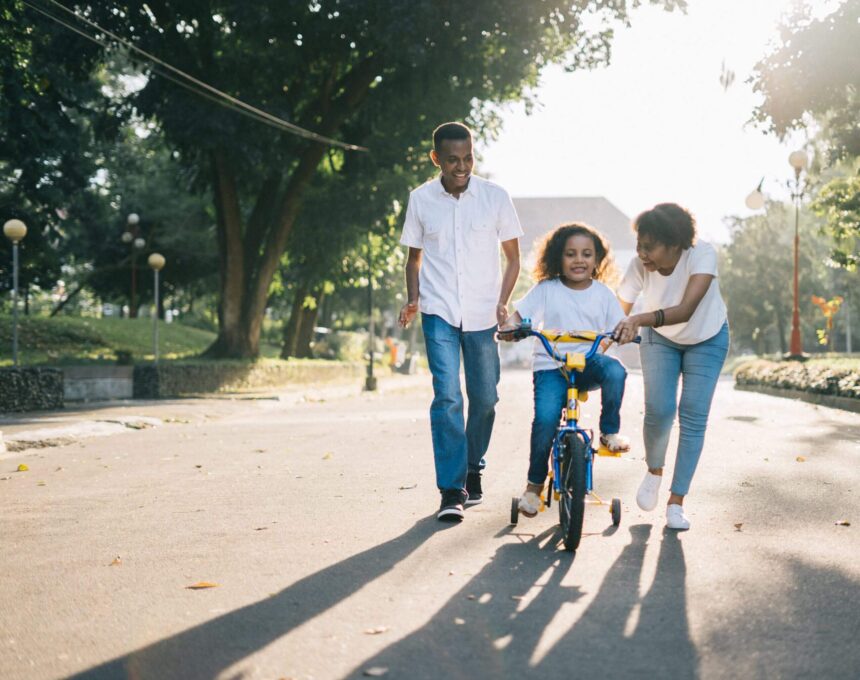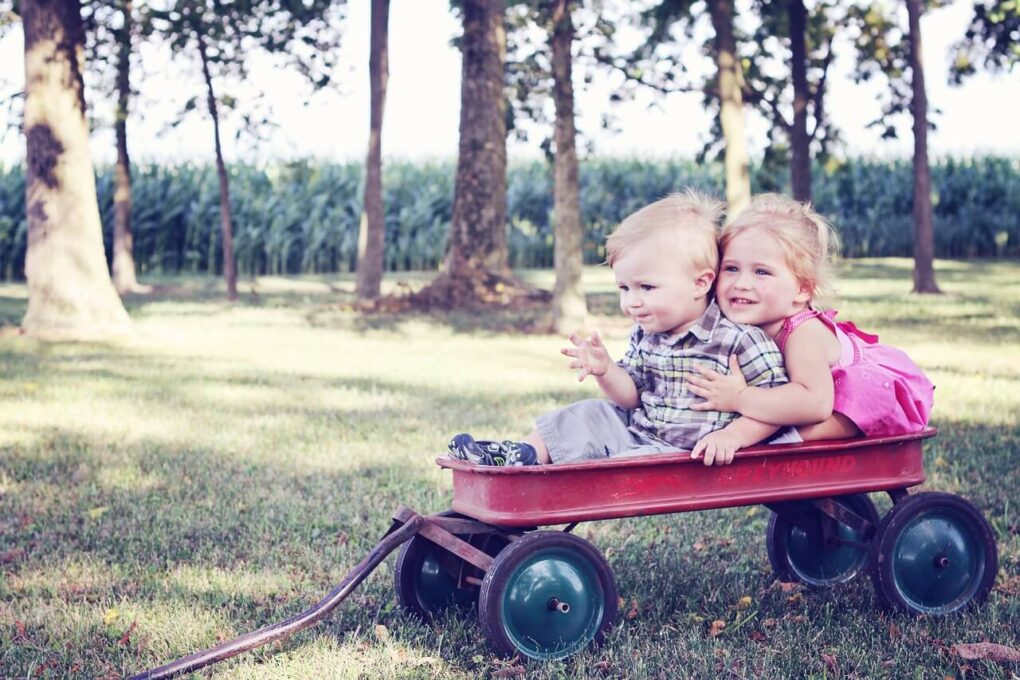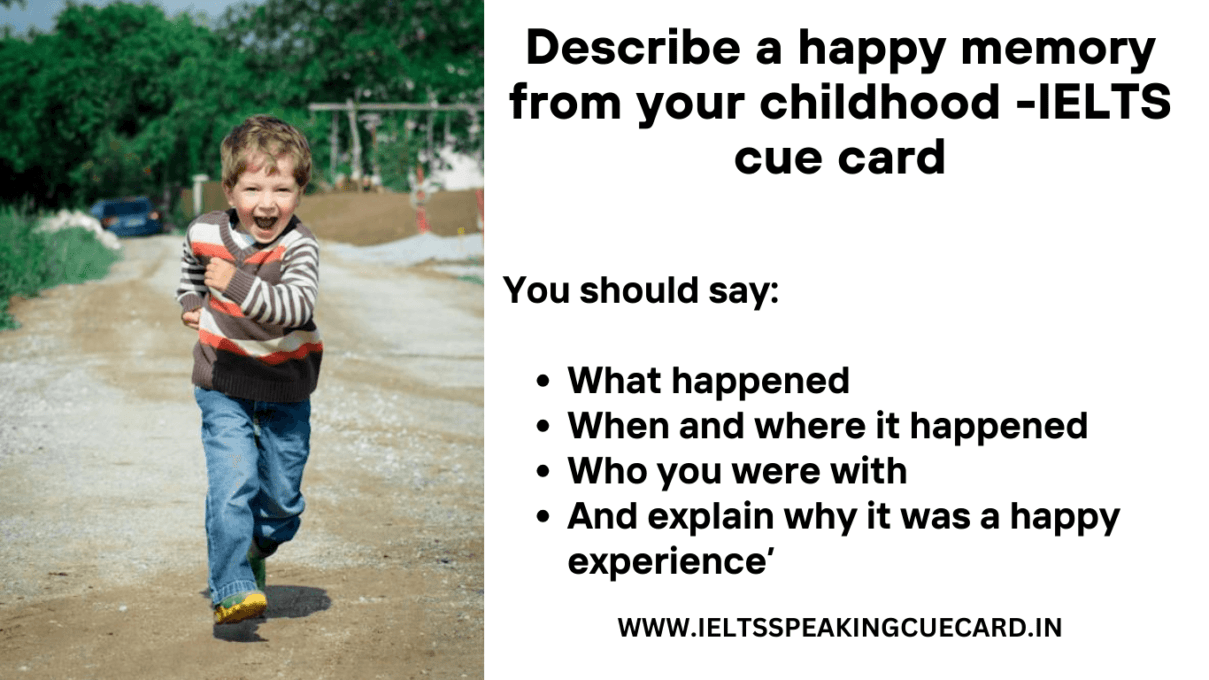Describe a happy memory from your childhood
You should say:
- What happened
- When and where it happened
- Who you were with
- And explain why it was a happy experience
Sample Answer-1

Describe a happy memory from your childhood IELTS CUE CARD
Introduction:
One of the fondest memories from my childhood that never fails to bring a smile to my face is the day of my seventh birthday. It was an enchanting experience that filled the air with laughter, joy, and the innocent exuberance that defines childhood.
What happened:
On my seventh birthday, my parents organized a surprise party at our backyard, adorned with colorful decorations and a vibrant theme that mirrored my favorite cartoon characters. The day was marked by laughter, games, and the delightful chatter of friends and family.
When and where it happened:
This delightful celebration unfolded on a sunny afternoon in the comfort of our backyard. The weather, perfectly aligned with the cheerful atmosphere, added a touch of warmth to the day. It was a simple yet magical setting that etched the memory deep into my heart.
Who you were with:
Surrounded by my closest friends, family members, and, of course, my favorite school teacher, the celebration felt like a gathering of kindred spirits. The presence of those who mattered most to me created an environment brimming with love and camaraderie.
And explain why it was a happy experience:
The happiness stemmed from the genuine surprises, heartfelt wishes, and the overwhelming feeling of being cherished. From the delightful birthday cake to the infectious laughter of friends, every element contributed to an atmosphere of pure joy. It wasn’t just a celebration; it was a collection of moments that encapsulated the innocence and happiness of childhood.
Sample Answer-2

Describe a happy memory from your childhood IELTS CUE CARD
Introduction:
One of the most cherished memories from my childhood is a day at the beach with my family. The sunlit sand, the soothing sound of waves, and the carefree laughter created a tapestry of joy that has stayed with me as a beacon of happiness throughout the years.
What happened:
On a bright summer day, my family and I decided to escape the routine and head to a pristine beach nearby. The day unfolded with building sandcastles, splashing in the gentle waves, and indulging in simple pleasures like relishing ice cream under the sun-kissed sky.
When and where it happened:
This delightful escapade took place during my summer vacation, adding an extra layer of bliss to the experience. The chosen beach, embraced by nature’s beauty, was a hidden gem away from the bustling city—a perfect canvas for creating lasting memories.
Who you were with:
The company of my parents and younger sibling made this day exceptional. We reveled in shared laughter, playful banter, and the warmth of familial bonds. The collective joy mirrored in their smiles turned an ordinary day into an extraordinary memory.
And explain why it was a happy experience:
The happiness derived from the simplicity of the moment—the feel of sand between our toes, the taste of salty breeze, and the sheer joy of being present with loved ones. It wasn’t about extravagant activities but the shared moments of connection that made this day a repository of happiness.
Follow-up Questions:
1.What do you think is the first moment of happiness that people remember?
The first moment of happiness people remember is often associated with childhood, such as a significant celebration, a joyful family event, or a memorable interaction with friends. These early experiences tend to leave a lasting impact on one’s memory.
2.Why do you think some people remember more than others? Or some people have a better memory than others?
Memory retention can vary due to factors like individual cognitive abilities, personal experiences, and the emotional significance attached to specific memories. Some people might have a natural inclination or practice better memory-enhancing habits.
3.What kinds of things do people need to remember nowadays?
In the modern age, people need to remember a wide range of information, from daily tasks and appointments to important work-related details. Additionally, remembering passwords, phone numbers, and digital information has become crucial in our interconnected world.
4.What do you think we shouldn’t forget?
It’s essential not to forget the values that shape our character, the lessons learned from experiences, and the importance of maintaining meaningful relationships. Remembering to be compassionate, kind, and understanding contributes to personal growth.
5.Why do some people remember more of their childhood than others?
Childhood memories are often emotionally charged, and individuals with a strong emotional connection to their early experiences are likely to remember more. Additionally, the frequency of recalling or revisiting these memories can influence retention.
6.What can people do to improve their memory?
Simple practices such as maintaining a healthy lifestyle, getting adequate sleep, staying mentally active through activities like reading and puzzles, and practicing mindfulness can contribute to improved memory. Creating associations and using mnemonic devices are also effective techniques.
7.What is your earliest memory that you can still remember now?
My earliest vivid memory is of a family picnic near a serene lake. The laughter, the smell of homemade food, and the feeling of contentment during that day remain etched in my mind as a snapshot of early childhood happiness.

